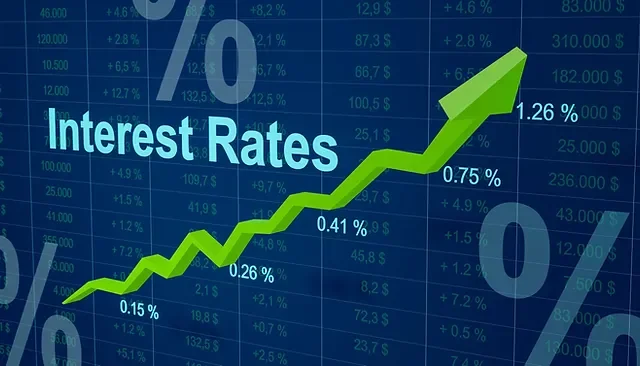Introduction:
The success of the stock market and interest rates are two important factors that influence how the financial markets behave. While stock market performance reflects the overall movement and changes in stock prices within a specific market or exchange, interest rates refer to the cost of borrowing or the return generated on investments. For investors, analysts, and policymakers, understanding how interest rates affect stock market performance is essential because it offers information about the state of the economy, investor mood, and prospective risks and opportunities in the market.
Interest rates and stock market performance have a complex relationship that is influenced by many different variables, including market sentiment, monetary policies, economic indicators, and company-specific fundamentals. Understanding the interaction between these components is crucial for analysing and interpreting market trends because the cause-and-effect relationship between them is not straightforward.
What is Interest Rate?

Interest rates have a significant impact on borrowing costs, investment choices, and economic expansion. The stock market’s performance can be impacted by changes in interest rates since they can have an effect on business profits, consumer spending, and the cost of capital. In addition, interest rates play a critical role in stock valuation methods like discounted cash flow analysis, where the discount rate serves as a proxy for the market interest rate.
What is Stock Market Performance?

The general movement and shifts in stock prices within a specific market or stock exchange are referred to as stock market performance. Indexes that track the overall performance of a chosen selection of equities, like the S&P 500, Dow Jones Industrial Average, or NASDAQ Composite Index, are frequently used to measure it. The value and profits produced by the stocks traded on the exchange are reflected in stock market performance, which also serves as a gauge of the market’s general health and investor mood.
How Does Interest Rate and Stock Market Performance work in Stock Market ?
- Interest rates have an impact on both the cost of borrowing for businesses and individuals as well as investment decisions. Borrowing costs drop at low interest rates, making it more affordable for businesses to obtain funds for investment and growth. This can boost business earnings, promote economic growth, and have a beneficial effect on stock market performance. A rise in demand and stock prices may result from people investing in stocks rather than low-yielding fixed-income instruments as a result of lower borrowing costs.
- Interest rates are taken into account when valuing companies using discounted cash flow (DCF) analysis. By discounting anticipated future cash flows at a suitable interest rate, the DCF model calculates the present value of those predicted cash flows for a stock. The DCF model’s discount rate falls when interest rates are low, resulting in larger present values and perhaps higher stock prices. In contrast, as the discount rate rises with an increase in interest rates, current values decline and perhaps stock prices do as well.
- Interest rates have an impact on economic growth, which can then have an effect on company profitability and, ultimately, the performance of the stock market. Low interest rates have the potential to boost the economy, boost consumer spending, and promote business profitability, all of which can boost stock values. On the other hand, high interest rates may slow economic expansion, raise the cost of business borrowing, and possibly result in decreased corporate profits and stock market falls.
- Interest rate changes may have an effect on investor sentiment and behaviour, according to the market. In order to get larger returns relative to low-yielding fixed-income investments, investors may be more ready to take on risk while interest rates are low and invest in equities. Stock prices may rise as a result of this increased demand for equities. On the other hand, rising interest rates may encourage some investors to move their money away from equities and towards fixed-income investments, which could put downward pressure on stock prices.
- Central bank policies: Central banks are key players in deciding interest rates and carrying them out. Market mood and investor expectations can be significantly impacted by changes in interest rates made by central banks. Since they reflect the central bank’s judgement of the state of the economy and probable future policy moves, central bank statements or actions on interest rate adjustments can have an impact on stock market performance.
It’s crucial to keep in mind that, while interest rates might have an impact on stock market performance, they are not the only one. The dynamics of the stock market are also significantly influenced by other factors, including firm fundamentals, market circumstances, geopolitical developments, and investor attitude. Therefore, for a thorough stock market research, knowing the interaction between interest rates and different market components is crucial.
Advantages and Disadvantages of Interest Rate and Stock Market Performance
Advantages:
- Investment Choices: Investors can use the correlation between interest rates and stock market performance to their advantage when choosing their investments. Investors can modify their portfolios accordingly and perhaps profit from market opportunities by having a thorough understanding of how changes in interest rates might affect stock prices.
- Market analysis: Investigating the connection between interest rates and stock market performance can reveal information about the state of the economy as a whole. Studying how interest rates affect stock prices can assist investors and analysts gauge market mood, inflation expectations, and potential hazards or opportunities. Interest rates are a leading indicator of the state of the economy.
- Diversification Techniques: Investors can diversify their portfolios across asset classes by following the correlation between interest rates and stock market performance. Investors may shift more money to equities to seek out bigger returns while interest rates are low. For stability and income generation, investors can think about moving some investments to fixed-income instruments when interest rates are high.
Disadvantages:
- Interest rates and stock market performance have a complicated relationship that is influenced by a variety of factors. The relationship between stock prices and other factors, such as market sentiment, economic statistics, and geopolitical developments, is not one of straightforward cause and effect. Relying exclusively on the correlation between interest rates and the stock market may oversimplify market dynamics.
- Volatility and Uncertainty: Interest rates can fluctuate and be unpredictable, particularly when they are impacted by central bank policies and economic situations. It might be difficult for investors to effectively estimate and modify their investment plans based purely on interest rate movements when there are abrupt changes in interest rates since they can cause volatility in the stock market.
- Lagging Indicator: Changes in interest rates may take some time to completely reflect in the stock market. Stock prices reflect market expectations, and it could take some time for investors to adjust their decision-making strategies in response to fresh interest rate information. Therefore, it’s possible that the correlation between interest rates and stock market performance won’t always offer quick and accurate signals for making investment decisions.
In conclusion, while comprehending the connection between interest rates and stock market performance can offer insightful information, it is crucial to proceed carefully and take other market elements into account. To make wise investing selections, investors should do extensive research, diversify their portfolios, and do detailed market analysis.
Analyzing the Relationship between Interest Rate and Stock Market Performance
Interest rates and stock market performance have a complicated and changing relationship. The actions of investors, the value of companies, and the general success of the stock market can all be significantly impacted by changes in interest rates. Here is how this connection is explained:
1. Interest Rates and Investor Behaviour: When borrowing costs are low, investors may be more likely to borrow money to make stock market investments. In comparison to alternative investment options like fixed-income assets, which typically offer lower yields in a low-rate environment, lower interest rates might make stocks considerably more alluring. This increasing demand for equities may be a factor in the stock market’s higher price trends.
On the other hand, when interest rates are high, borrowing costs increase and investors can be less willing to borrow money to make investments. Fixed-income assets may seem more tempting at higher interest rates, causing investors to move their money away from stocks. Stock prices may be under pressure to decline as a result of this drop in demand for equities.
2.Discounted Cash Flow Model: The discounted cash flow (DCF) model uses interest rates to determine how much equities are worth. By discounting anticipated future cash flows from a stock at a suitable interest rate, this approach determines the present value of those cash flows. Lower present values and possibly lower stock prices arise from the DCF model’s discount rate rising in tandem with rising interest rates.
The DCF model’s discount rate, on the other hand, rises as interest rates fall, resulting in larger present values and perhaps higher stock prices. Changes in interest rates have a greater influence on the present value of distant cash flows, making this effect particularly important for businesses whose future cash flows are anticipated to be realised over a longer time horizon.
3.Economic Growth and Corporate Borrowing: Interest rates’ effects on corporate borrowing and economic growth can have an impact on stock market performance. When interest rates are low, borrowing money for investments and expansion by businesses is more affordable. This might energise the economy, increase business profits, and raise stock prices.
On the other hand, if interest rates rise, businesses’ costs of borrowing rise as well, possibly reducing their capacity to invest, grow, or pay off debt. This may reduce the likelihood of economic growth and have a negative effect on business earnings, which would diminish stock market performance.
Conclusion:
In the ecology of the stock market, interest rates and stock market performance are intricately linked. Changes in interest rates can have a substantial impact on investor behaviour, corporate valuations, borrowing costs, investment choices, and economic development, all of which affect stock market performance.
Lower interest rates tend to encourage borrowing, support economic expansion, and raise the relative attractiveness of stocks, which could result in more activity on the stock market and higher stock prices.
Although there is a correlation between interest rates and stock market performance, it is not a straight line. In addition to interest rates, other variables that affect stock prices include firm fundamentals, geopolitical events, and monetary policy. Therefore, while analysing and choosing to participate in the stock market, it is crucial to take a wide range of criteria into account.
Investors, analysts, and politicians can all benefit from having a better understanding of the relationship between interest rates and stock market performance. Investors can make informed decisions and modify their investment plans by keeping track of changes in interest rates, assessing economic conditions, and analysing market patterns.
FOLLOW OUR WEBSITE: https://learningsharks.in/
FOLLOW OUR PAGE: https://www.instagram.com/learningsharks/
